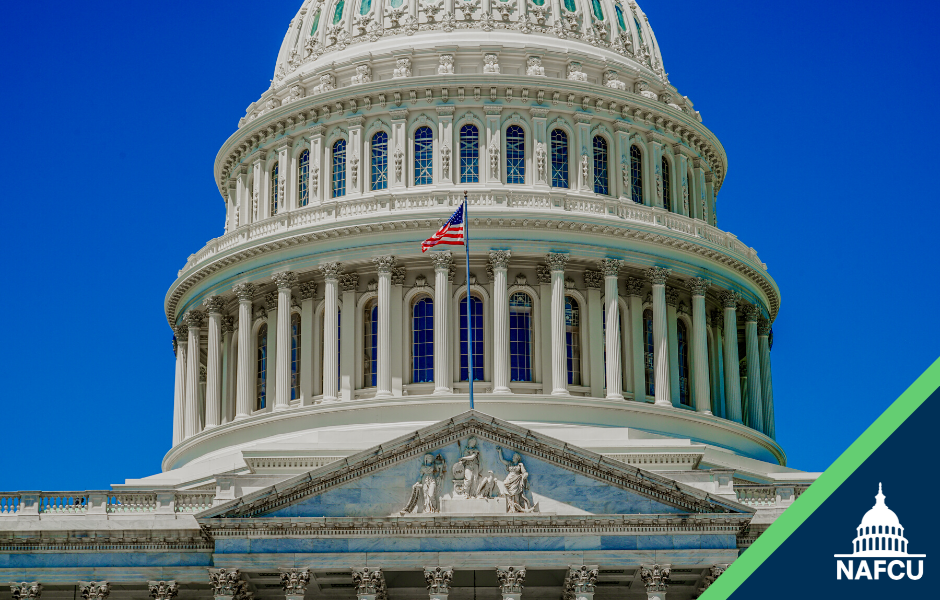Newsroom
NAFCU details concerns ahead of HFSC markup of critical CU bills
 The House Financial Services Committee today will convene for a markup to discuss several pieces of legislation, including three bills that affect the credit union industry: the NAFCU-backed Expanding Financial Access for Underserved Communities Act and Close the ILC Loophole Act and the NAFCU-opposed Strengthening Cyber-Security for the Financial Sector Act. Ahead of the markup, NAFCU's Brad Thaler wrote to the committee to reiterate the concerns of the credit union industry and advocate on behalf of credit unions and their 130 million members.
The House Financial Services Committee today will convene for a markup to discuss several pieces of legislation, including three bills that affect the credit union industry: the NAFCU-backed Expanding Financial Access for Underserved Communities Act and Close the ILC Loophole Act and the NAFCU-opposed Strengthening Cyber-Security for the Financial Sector Act. Ahead of the markup, NAFCU's Brad Thaler wrote to the committee to reiterate the concerns of the credit union industry and advocate on behalf of credit unions and their 130 million members.
H.R. 7003, the Expanding Financial Access for Underserved Communities Act
The NAFCU-backed bill would allow all types of federal credit unions to add underserved areas to their field of membership; and adds "banking deserts," areas not within 10 miles of a branch of a financial institution, to the definition of an underserved area. In addition, this necessary legislation also exempts member business loans (MBL) made by credit unions in underserved areas from the MBL cap.
Thaler, NAFCU’s vice president of legislative affairs, noted that many credit unions "want to do more to help underserved areas as banks abandon them and passing H.R. 7003 to help credit unions fill the void." However, he also notes that the legislation does not directly grant underserved areas to credit unions, but rather it allows them to apply to the NCUA to add these areas should they meet the necessary criteria.
H.R. 5912, the Close the ILC Loophole Act
The association has encouraged Congress to close the industrial loan company (ILC) loophole in current law and stop large commercial companies from taking advantage of the ILC charter to gain access to the financial system by passing this necessary legislation.
In the letter, Thaler explained this legislation is a "comprehensive solution" to closing the ILC loophole once and for all. "[…] we urge its adoption at markup without additional amendments that seek to water-down the important strides that the legislation is taking," added Thaler.
H.R. 7022, the Strengthening Cyber-Security for the Financial Sector Act
This legislation would give both the NCUA and the Federal Housing Finance Agency additional third-party vendor examination authority, something NAFCU has avidly advocated against. Most recently, NAFCU Thursday urged the House Financial Services Committee Artificial Intelligence Task Force to reject this legislation outright. NAFCU has also expressed concerns about the wide authority it would give the NCUA and the potential costs to credit unions.
While NAFCU and NAFCU-member credit unions strongly believe that that cybersecurity, including the security of vendors that credit unions do business with, is an important issue, Thaler explains the legislation as it is currently written will place the burden on credit unions. "Implementing such new authority for the NCUA would require significant expenditures by the agency," wrote Thaler. "The history of the NCUA’s budget growth has shown that these costs would ultimately be borne by credit unions and their members."
In addition, Thaler noted that there are other tools already in place for the NCUA to gain access to information about vendors. "We believe the agency’s time and resources are better focused on reducing regulatory burden by coordinating efforts among the financial regulators," added Thaler.
The markup is scheduled for 12:00 p.m. Eastern; NAFCU will engage Congress and update credit unions after the markup via NAFCU Today.
Share This
Related Resources
Add to Calendar 2024-06-26 14:00:00 2024-06-26 14:00:00 Gallagher Executive Compensation and Benefits Survey About the Webinar The webinar will share trends in executive pay increases, annual bonuses, and nonqualified benefit plans. Learn how to use the data charts as well as make this data actionable in order to improve your retention strategy. You’ll hear directly from the survey project manager on how to maximize the data points to gain a competitive edge in the market. Key findings on: Total compensation by asset size Nonqualified benefit plans Bonus targets and metrics Prerequisites Demographics Board expenses Watch On-Demand Web NAFCU digital@nafcu.org America/New_York public
Gallagher Executive Compensation and Benefits Survey
preferred partner
Gallagher
Webinar
Add to Calendar 2024-06-21 09:00:00 2024-06-21 09:00:00 The Evolving Role of the CISO in Credit Unions Listen On: Key Takeaways: [01:30] Being able to properly implement risk management decisions, especially in the cyber age we live in, is incredibly important so CISOs have a lot of challenges here. [02:27] Having a leader who can really communicate cyber risks and understand how ready that institution is to deal with cyber events is incredibly important. [05:36] We need to be talking about risk openly. We need to be documenting and really understanding what remediating risk looks like and how you do that strategically. [16:38] Governance, risk, compliance, and adherence to regulatory controls are all being looked at much more closely. You are also seeing other technology that is coming into the fold directly responsible for helping CISOs navigate those waters. [18:28] The reaction from the governing bodies is directly related to the needs of the position. They’re trying to help make sure that we are positioned in a way that gets us the most possibility of success, maturing our postures and protecting the institutions. Web NAFCU digital@nafcu.org America/New_York public
The Evolving Role of the CISO in Credit Unions
preferred partner
DefenseStorm
Podcast
AI in Action: Redefining Disaster Preparedness and Financial Security
Strategy
preferred partner
Allied Solutions
Blog Post
Get daily updates.
Subscribe to NAFCU today.
